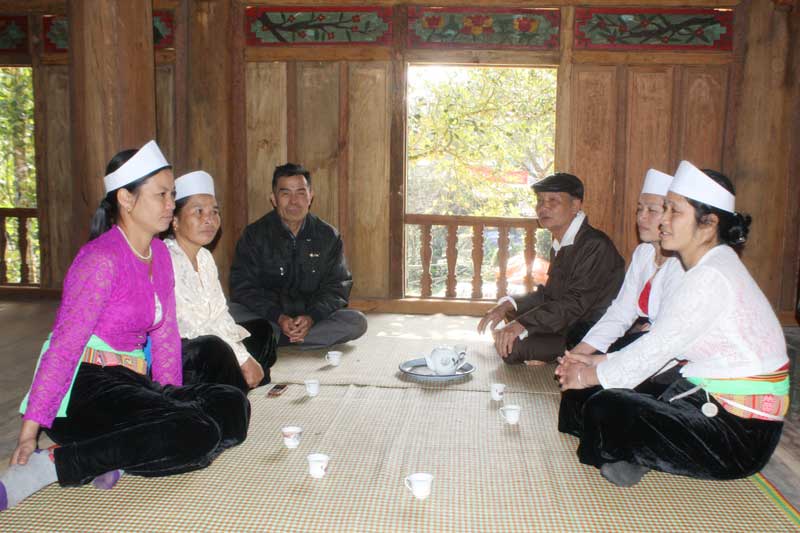
(HBO) - Doi singing, also known as Vi or Dum singing, - a form of cultural activity has existed since the time of "Laying land and laying water” of Muong ethnic people. In the modern life rhythm, with the introduction of many types of culture and arts, Doi sing has no longer kept its vitality as in the old days. However, the singing filled with poetry, showing the skillful response is still an attractive spiritual dish in the area of Muong in the province.
 Doi singing is a special cultural activity taking place in
daily life of Muong ethnic people. Photo taken at Ngoc Lau commune (Lac Son).
Doi singing is a special cultural activity taking place in
daily life of Muong ethnic people. Photo taken at Ngoc Lau commune (Lac Son).
Doi singing, in fact, is a conversation, confrontation in
the daily life of Muong ethnic people. The space for Doi singing can be on the
fields, in the roof of a stilt house or anywhere. The difference here is that
the words of the heart, the story is "set to music”, so it has the rhythm,
making people "drunk” each. In the past, each Muong village had good singers of
Doi, who is respected by the people in the village. Therefore, whenever there
is festival in the village, the good singers of Doi are hunted. The criteria to
asses a good singer of Doi are very strict. In addition to possessing a sweet
and rich voice, that person must be very active with rhyming and rhythmic words
like rhyme of poetry. Due to the attractiveness of Doi singing in Muong
villages, there used to be a lot of singings overnights. Many people were so
passionate about their singing that they became husband and wife.
Rhyming and rhythmic words to create good singing is
essentially a rhyme like the rhyme of sin-eight-word distich meter. That is,
the sixth word of a six-word sentence must rhyme with the sixth word of an
eight-word sentence. Folk artists have also applied this principle to compose
Muong songs. For example, Mrs. Bui Thi Xuan in Voi hamlet, Lien Vu commune has
composed dozens of Muong songs for many years. In the book recording dozens of
songs of Mrs. Xuan, we all realize that if we do not "set to music” in
accordance with the Muong folk song, these are all poems composed in the form
of sin-eight-word distich meter.
The quality of poetry in Doi singing is expressed not only
through the principle of composing many similarities with the form of
sin-eight-word distich meter, but also through romantic images or the rhetoric
that the singers in Muong villages have skillfully been using. In particular,
the topic of love singing clearly expresses the way that boys and girls of
Muong cleverly use the metaphorical images to express their feelings.
In short, it is the soft rhyming and the use of subtle
rhetoric that have created an appeal for the sentences of Doi singing of Muong
ethnic people. Although Doi singing has gradually disappeared, in remote and
upland areas, Doi singing is still a popular lifestyle of Muong ethnic people.
Especially, in the happy spring days, welcoming the New Year, the sentences of
Doi singing resound in Muong villages and in folk festivals in early spring.
With an increasingly vibrant and widespread emulation movement aimed at building cultured residential areas and cultured families, Yen Thuy District has been making steady progress toward improving both the material and spiritual well-being of its people, while fostering a civilized, prosperous, beautiful, and progressive community.
Once lacking recreational spaces and community facilities, Residential Group 2 in Quynh Lam Ward (Hoa Binh City) has recently received attention for the construction of a new, spacious, and fully equipped cultural house. The project followed the model of state support combined with public contributions in both labor and funding.
The "All people unite to build cultural life" movement, which has been effectively integrated with Kim Boi district’s socio-economic development goals, is fostering a lively spirit of emulation across local residential areas, hamlets, villages, public agencies, and enterprises. In addition, through the initiative, traditional cultural values are being preserved and promoted, while community solidarity and mutual support in poverty reduction and economic development are being strengthened.
A working delegation of the Hoa Binh provincial People’s Committee led by its Permanent Vice Chairman Nguyen Van Toan on June 11 inspected the progress of a project to build the Mo Muong Cultural Heritage Conservation Space linked to tourism services in Hop Phong commune, Cao Phong district.
Born and growing in the heroic land of Muong Dong, Dinh Thi Kieu Dung, a resident in Bo town of Kim Boi district, in her childhood was nurtured by the sweet lullabies of her grandmother and mother. These melodies deeply imprinted on her soul, becoming an inseparable part of her love for her ethnic group's culture. For over 20 years, this love for her hometown has driven Dung to research, collect, and pass down the cultural values of the Muong people to future generations.
In the final days of May, the Ethnic Art Troupe of Hoa Binh Province organized performances to serve the people in remote, mountainous, and particularly disadvantaged areas within the province. These were not just ordinary artistic shows, but they were the meaningful journeys aimed at spreading cultural values, enhancing the spiritual life of the people and contributing to the preservation of ethnic minority cultural identities.



 Doi singing is a special cultural activity taking place in
daily life of Muong ethnic people. Photo taken at Ngoc Lau commune (Lac Son).
Doi singing is a special cultural activity taking place in
daily life of Muong ethnic people. Photo taken at Ngoc Lau commune (Lac Son).